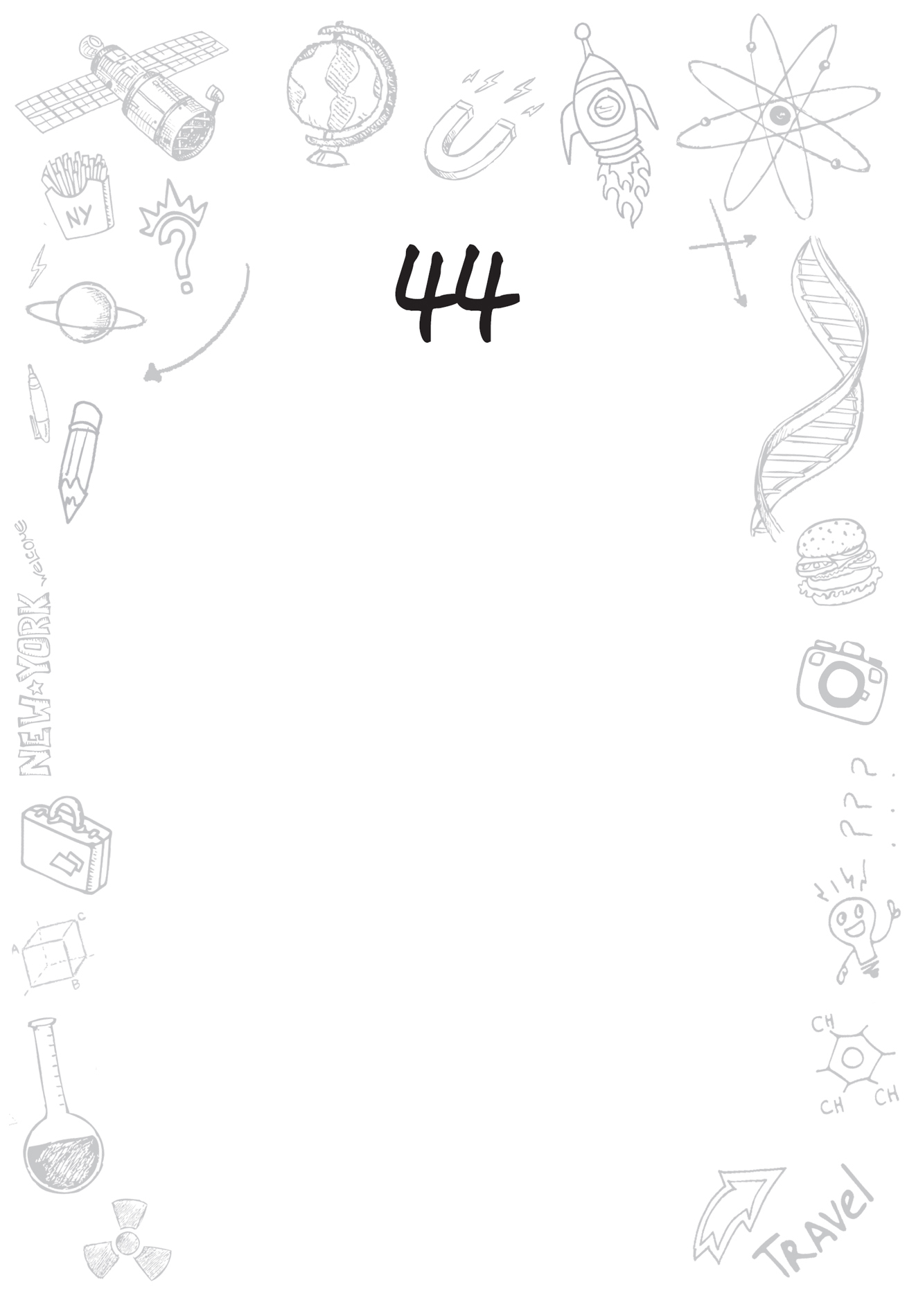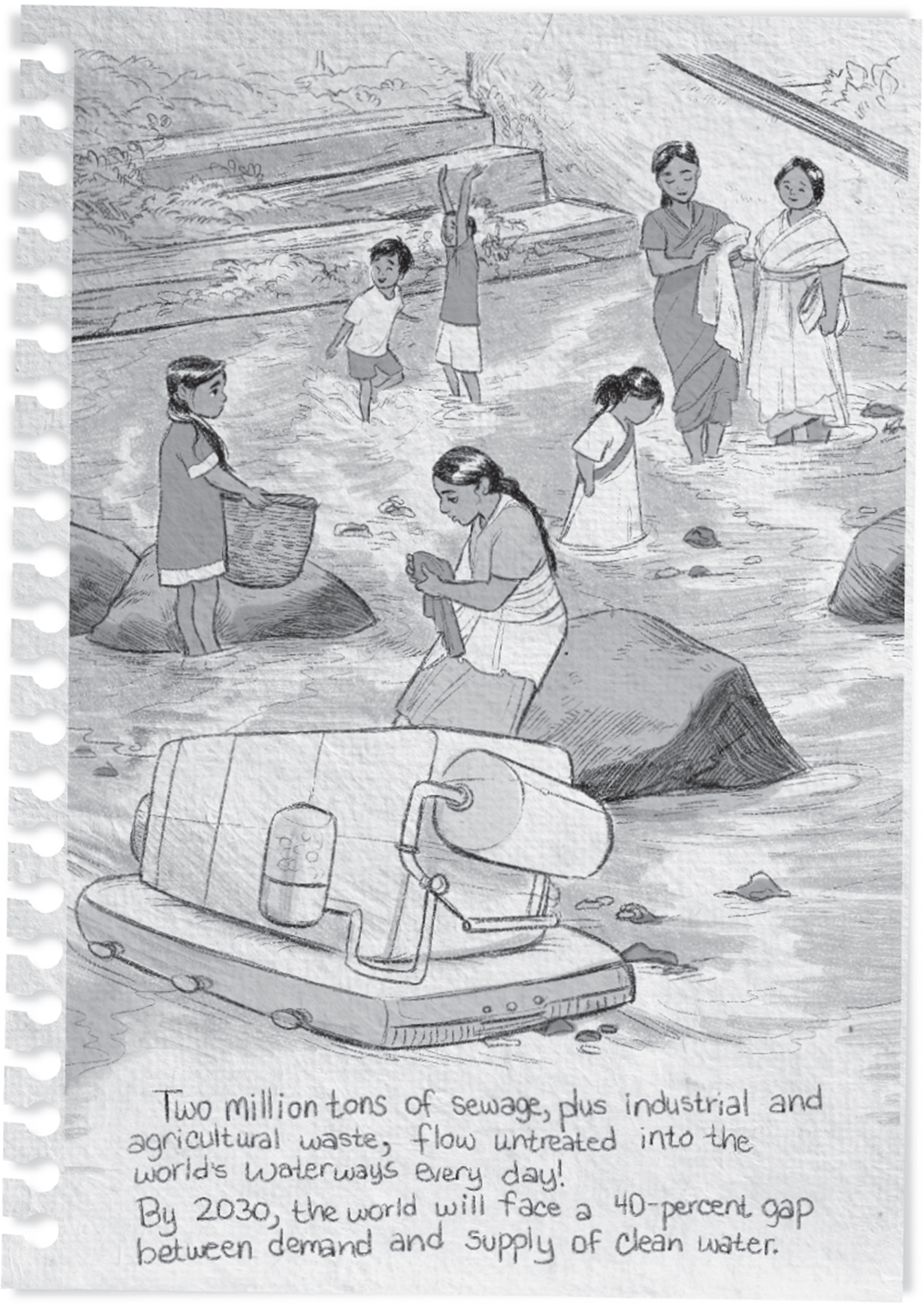
It took a week to build, but, finally, Max and her team set up their bubble contraption on the banks of the polluted Narmadavari River, just outside Jitwan.
“Good work, Klaus,” said Max.
“Well, it was really a team effort,” said Klaus. “I mean, once I designed it. That’s when everybody else pitched in. But you’re right. Before that, it was all me. Hey, where’s the documentary lady?” He lovingly patted a metal tank. “This baby is ready for its close-up.”
“I think she was filming in town today,” said Keeto. “As brilliant as your invention is, Klaus, it’s not very visually thrilling.”
“Are you kidding? Look at all those tubes and switches and gizmos!”
“We will need to guard our dissolved-air flotation device twenty-four/seven,” Vihaan said to Charl and Isabl. “Dada tells me that those two gentlemen who threatened us last week are very well connected with all the wrong sort of people. They have much money and power. They control all the Fresh & Pure bottled water vending machines up and down the boulevard. They also have a few corrupt local politicians in their pocket.”

“Don’t worry, we’ll handle security,” said Charl. “You guys focus on solving the water problem.”
“But the packaged-water men will send more enforcers to threaten us,” Vihaan continued. “And our families.”
“You’re worried about what they might do to your grandfather?” Max asked.
Vihaan nodded. “His job is hard enough. I don’t want to make it worse for him.”
“So let’s leave town,” said Toma.
“No,” said Max. “We need to test this unit. If we can clean this water, it will make life easier for your grandfather and the other key men.”
“The one who controls the water will control the town,” muttered Vihaan, catching on.
“We’re almost ready to fire her up,” said Klaus. “I wish that lady was here with her camera….”
“Dude, you probably shattered her lens,” joked Keeto. “I should be the new CMI spokesperson.”
“Wait,” said Hana. “We’re getting ahead of ourselves. We still need to figure out some sort of filtration system.”
“We also still need to eat lunch,” said Keeto. “I’m starving.”
“You’re right,” said Max. “Let’s take a break. You guys have definitely earned one.”
“Vihaan?” said Klaus, putting down his tools. “Where can we get some more of that spicy Indian spaghetti? That stuffis amazing, even if it is vegetarian.”
Vihaan finally smiled. “I know a place nearby.”
“Then what are we doing here?” said Keeto.
The entire team left the riverbank with Isabl. Charl stayed behind to guard the dissolved-air flotation device.
At the small restaurant Vihaan took them to, the spaghetti was spicy—with chili flakes and spices, like curry, whisked into the tomato sauce. Everyone was twirling their forks and digging in.
Except Max.
“Interesting,” she said.
“You don’t enjoy the spiciness?” asked Vihaan when he noticed that Max wasn’t eating. She was just pushing her noodles around her plate.
“No. It’s great. But look how the sauce seeps through the thinner noodle layers near the plate’s perimeter but not through the thicker pile here at center.”
“I guess,” said Klaus, his mouth full of pasta.
“Spaghetti is a membrane,” said Max, absentmindedly. “If you take this model to the logical extreme, you can densely pack the skinniest possible noodles together … and create a mesh that filters out the tiniest of particles.”
“But,” said Annika, mashing her noodles into a flat mat, soaking up sauce, “if our filter is soaking up all the impurities, it’s eventually going to get clogged.”
“Good point,” said Vihaan. “How can we keep the filters clear, Max?”
She thought about that.
And then she thought about Einstein.
How he won his Nobel prize for his work on the photoelectric effect, which says that light shining on an object gives that object’s electrons energy, causing them to spring off into the space surrounding it.
“Photocatalysis,” said Max.
“You want to take photos of cat tails?” said Klaus.
“Brilliant,” said Vihaan.
“Thanks,” said Klaus.
“No, I mean the photocatalysis idea,” Vihaan continued. “It takes Einstein’s concept of the photoelectric effect but, in this case, the light shining on the object, the catalyst, gives electrons energy that drives chemical reactions.”
“Titanium dioxide!” said Max.
“Indeed!” agreed Vihaan. “TiO2, when activated by light, can break down pollutants into harmless little particles.”
“And,” said Annika, “if we harness the light we need from the sun, there’s no extra energy cost.”
“Our filtering problem is solved!” said Max.
“Hang on,” said Isabl, touching her earpiece. “We have another problem. Down by the river. Charl says our two friends are back. And this time, they brought along a small army.”